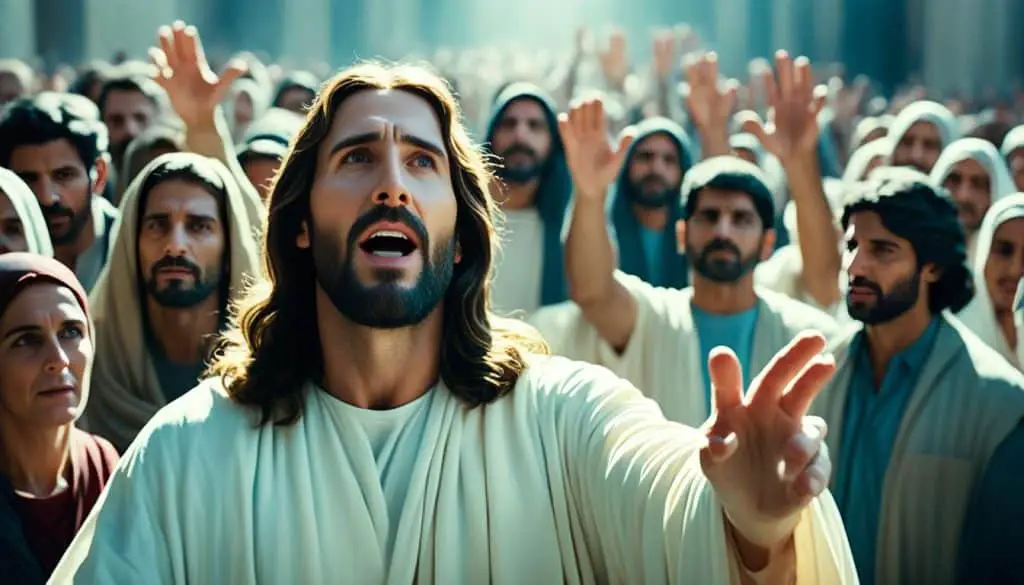Have you ever wondered how to truly love your neighbor? The Bible provides us with numerous examples of neighborly love that defy common beliefs and challenge societal norms. From the Good Samaritan’s selfless aid to the early church’s unity and care, these stories illustrate the power of love in action. So, how did these individuals and communities embody love and compassion? Let’s explore ten heartwarming examples of loving your neighbor as found in the Bible.
Throughout this article, we will delve into these stories, uncovering their timeless lessons and discovering how they can inspire us to show love and kindness to those around us. Whether you are looking for practical ways to love your neighbor or seeking inspiration for acts of compassion, this article will provide you with valuable insights from the Scriptures. So, are you ready to delve into these tales of love and discover how they can transform your understanding of neighborly love? Let’s begin.
The Good Samaritan (Luke 10:25-37)
In Luke 10:25-37, Jesus shares the parable of the Good Samaritan—an inspiring story that teaches us about the essence of true neighborly love. This powerful account emphasizes the importance of showing kindness and care towards a stranger in need, without prejudice or hesitation.
The parable begins with a religious expert questioning Jesus about eternal life and the commandments. In response, Jesus recounts the story of a man who fell victim to robbers and was left wounded on the side of the road. Both a priest and a Levite passed him by, avoiding any involvement in his plight.
“But a Samaritan, as he traveled, came where the man was; and when he saw him, he took pity on him. He went to him and bandaged his wounds, pouring on oil and wine. Then he put the man on his own donkey, brought him to an inn, and took care of him.”
This compassionate act of the Samaritan, someone who belonged to a despised group by the Jews, exemplifies the true spirit of neighborly love. The Good Samaritan did not let societal differences or prejudices hinder him from demonstrating kindness and care towards a stranger in desperate need.
This parable serves as a constant reminder for us to show compassion and extend a helping hand to those we encounter, regardless of their background or circumstances. It challenges us to break down the barriers that divide us and embrace a genuine sense of community.
A Lesson in Kindness and Care
The Good Samaritan’s actions teach us invaluable lessons about the power of kindness and care. His willingness to stop, tend to the injured man’s wounds, and provide for his needs reveals the depth of his compassion and empathy.
By choosing to be a good neighbor, the Samaritan sets a standard of love and selflessness that we should aspire to emulate in our own lives. His example encourages us to look beyond ourselves and actively seek opportunities to help those who are in distress or facing adversity.
Seeing the Stranger in Need
The parable of the Good Samaritan also challenges us to recognize the strangers in need around us. It reminds us that acts of neighborly love are not limited to those in our immediate circle but include anyone who requires our care and assistance.
When we open our eyes and hearts to the needs of others, we become agents of change, spreading love, and healing in a world that desperately needs it. This willingness to extend ourselves to those who may be vastly different from us is the essence of true neighborly love.
Let us follow the example of the Good Samaritan and strive to be true neighbors to those in need, showing kindness, care, and compassion to the strangers we encounter along life’s journey.
Boaz’s Kindness to Ruth (Ruth 2)
In the book of Ruth, we are presented with a beautiful example of Boaz’s extraordinary kindness and compassion towards Ruth, a Moabite widow. Boaz’s actions exemplify the value of extending care and protection to those who are vulnerable.
Ruth, having lost her husband, finds herself in a foreign land seeking refuge. As a widow and a Moabite, she faces the challenges of displacement and social marginalization. However, Boaz, a relative of her deceased husband, opens his heart and extends a helping hand.
Boaz not only offers Ruth protection but also provides her with an opportunity to glean in his fields. This act of kindness not only ensures her physical sustenance but also grants her a sense of security and belonging.
Boaz’s kindness is demonstrated when he instructs his workers to leave behind extra sheaves of grain for Ruth to collect (Ruth 2:16). This generous gesture goes beyond societal norms, demonstrating Boaz’s unwavering compassion towards her.
“It has been fully reported to me, all that you have done for your mother-in-law since the death of your husband, and how you have left your father and your mother and the land of your birth, and have come to a people whom you did not know before. The Lord repay your work, and a full reward be given you by the Lord God of Israel, under whose wings you have come for refuge.” – Ruth 2:11-12
This heartwarming interaction between Boaz and Ruth encourages us to value and support those who are vulnerable in our communities. Boaz’s genuine kindness serves as a reminder that even small acts of compassion can make a world of difference to someone in need.
Supporting Ruth’s Journey: Boaz’s Acts of Kindness
| Acts of Kindness | Significance |
|---|---|
| Providing protection for Ruth | Ensured Ruth’s safety and security in a foreign land |
| Granting Ruth permission to glean in his fields | Offered Ruth an opportunity to work and sustain herself |
| Instructing his workers to leave extra sheaves for Ruth | Ensured Ruth’s access to an abundance of resources |
This table highlights the specific acts of kindness that Boaz bestowed upon Ruth, emphasizing their significance in providing her with the necessary support and aid during her difficult journey.
Boaz’s unwavering compassion towards Ruth serves as a timeless example for us all. It invites us to reflect on how we can extend kindness and protection to those around us, particularly those who are vulnerable and in need of support.
Joseph’s Forgiveness of His Brothers (Genesis 50:15-21)
The story of Joseph forgiving his brothers in Genesis 50 demonstrates the power of love and mercy. Despite being wronged by them, Joseph chooses to forgive and provide for his brothers, showing us the importance of forgiveness in our relationships.
“But Joseph said to them, ‘Do not fear, for am I in the place of God? As for you, you meant evil against me, but God meant it for good, to bring it about that many people should be kept alive, as they are today. So do not fear; I will provide for you and your little ones.” And he comforted them and spoke kindly to them.”
In the biblical account, Joseph’s brothers had sold him into slavery out of jealousy. Years later, in a twist of fate, Joseph becomes a powerful official in Egypt. When a famine causes his brothers to seek food, they come face to face with Joseph without recognizing him. Instead of seeking revenge, Joseph chooses to extend forgiveness, love, and mercy.
This act of forgiveness not only reconciles Joseph with his brothers but also brings about a deeper understanding of the power of love and mercy. Joseph’s decision to provide for his brothers despite their past actions demonstrates his willingness to let go of bitterness and embrace the opportunity for reconciliation.
The Impact of Joseph’s Forgiveness
Joseph’s forgiveness teaches us valuable lessons about the importance of forgiveness in our own lives. By choosing to let go of past hurts and extend mercy, we create the space for healing and restoration. Forgiveness can transform broken relationships and enable us to move forward in love.
Joseph’s forgiveness also reflects God’s grace towards us. Just as Joseph chooses to forgive his brothers, God extends His forgiveness and mercy to us, showing us the boundless love He has for each of His children.
The Value of Love and Mercy
In a world often filled with conflict and bitterness, Joseph’s story reminds us of the transformative power of love and mercy. When we choose to forgive and extend kindness to those who have wronged us, we not only free ourselves from the burden of resentment but also open the door to reconciliation and healing.
| Lessons from Joseph’s Forgiveness | |
|---|---|
| 1. Forgiveness is a choice. | |
| 2. Love and mercy can overcome past hurts. | |
| 3. Forgiveness leads to reconciliation and healing. | |
| 4. God’s love and grace are limitless. |
Joseph’s story serves as an inspiring example of the transformative power of forgiveness. By choosing to forgive and embrace love and mercy, we can break the cycle of hurt and open the door to restoration and healing in our relationships.

Abraham Pleads for Sodom (Genesis 18:16-33)
In Genesis 18, we encounter a remarkable story of Abraham’s plea on behalf of the wicked city of Sodom. This powerful narrative showcases Abraham’s deep concern for the well-being of others, even those he does not personally know. It serves as a timeless reminder of the importance of caring for our fellow human beings and advocating for their welfare.
Abraham’s plea to God on behalf of Sodom demonstrates his extraordinary compassion and empathy. Despite the city’s wickedness, Abraham exemplifies a profound concern for the lives of the people residing there. His genuine care compels him to approach the Almighty and intercede for their salvation.
“Then Abraham approached him and said: ‘Will you sweep away the righteous with the wicked? What if there are fifty righteous people in the city? Will you really sweep it away and not spare the place for the sake of the fifty righteous people?'”
This act of pleading reveals Abraham’s willingness to stand up for the people of Sodom, advocating for their potential righteousness and pleading for their lives to be spared. Despite the city’s reputation, Abraham’s concern for others compels him to challenge God’s decision, hoping for mercy and salvation.
“Far be it from you to do such a thing—to kill the righteous with the wicked, treating the righteous and the wicked alike. Far be it from you! Will not the Judge of all the earth do right?”
Abraham’s boldness in questioning God’s justice demonstrates his unwavering belief in God’s righteousness. He appeals to God’s character and sense of justice, emphasizing that it would be unjust to destroy the righteous along with the wicked. Abraham’s plea showcases his deep concern for fairness and compassion for even the most sinful individuals.
This story serves as a powerful reminder for us to have a genuine concern for the well-being of others, even those we may perceive as undeserving. Abraham’s compassionate plea challenges us to advocate for the welfare of others, extending grace and mercy when it is least expected.
Through Abraham’s example, we learn the profound impact of taking a stand for others and pleading for their salvation. It inspires us to demonstrate concern for our fellow human beings and strive to make a positive difference in their lives, just as Abraham did.
Abraham’s plea for Sodom remains a timeless reminder of the importance of empathy, compassion, and advocating for the well-being of others. It challenges us to go beyond our comfort zones, showing concern for even those we may consider unworthy. Let Abraham’s powerful example inspire us to be agents of change and love in a world that desperately needs it.
Jesus Healing the Sick and Needy (Gospels)
Throughout the Gospels, we witness numerous instances of Jesus showing love for his neighbors by healing the sick, casting out demons, and caring for the needy. These acts of compassion teach us to extend care and support to those who are suffering.
“And they brought to him all sick people who were taken with various diseases and torments, and those who were possessed with demons, and those who were lunatic and paralyzed. And he healed them.” – Matthew 4:24
Jesus not only preached about loving your neighbors but also demonstrated it through his actions. He showed great empathy and compassion towards those who were sick and in need. Whether it was healing physical ailments or casting out demons, Jesus provided hope and relief to the suffering.
His miracles of healing stand as a testament to his divine power and his unwavering commitment to caring for the most vulnerable members of society. Jesus reached out to the sick, the disabled, and the marginalized, offering them not just physical healing but also spiritual restoration.
One notable example is the story of the woman with the issue of blood. In Mark 5:25-34, we read about a woman who had been suffering from chronic bleeding for twelve years. She approached Jesus, believing that if she could just touch his cloak, she would be healed. As soon as she touched him, her bleeding stopped, and Jesus turned to her, acknowledging her faith and telling her, “Daughter, your faith has made you well.”
Another powerful example is the healing of the paralytic man in Capernaum. In Mark 2:1-12, we see a group of friends who brought a paralyzed man to Jesus, lowering him down through the roof since they couldn’t get through the crowded house. Jesus not only forgave the man’s sins but also healed him, allowing him to walk again.
These miraculous accounts of healing demonstrate Jesus’ deep concern for the physical and spiritual well-being of those in need. He touched the lives of countless individuals, restoring hope, dignity, and a sense of belonging.

| Healing Stories | Reference |
|---|---|
| Healing the blind man | Mark 10:46-52 |
| Raising Lazarus from the dead | John 11:1-44 |
| Healing the leper | Matthew 8:1-4 |
| Healing the paralyzed man | Matthew 9:1-8 |
Jesus not only healed physical ailments but also addressed the underlying spiritual and emotional needs of those he encountered. He emphasized the importance of faith and trust in God’s healing power. Through his miraculous acts, Jesus not only brought temporary relief from physical suffering but also offered eternal salvation and ultimate healing.
By following Jesus’ example, we can learn to be agents of healing and compassion in our own communities. We can extend a helping hand to the sick, pray for their well-being, and provide emotional support to those who are struggling. Just as Jesus showed love for his neighbors through healing, we too can make a difference in the lives of those around us.
Dorcas’ Acts of Charity (Acts 9:36-42)
In Acts 9:36-42, we are introduced to a woman named Dorcas, who was known for her acts of charity and good works, particularly in making clothes for widows.
“In Joppa, there was a disciple named Tabitha (which, when translated, is Dorcas) who was always doing good and helping the poor.”
Dorcas’s example serves as a powerful reminder of the importance of practical acts of kindness and generosity. She saw the needs of widows in her community and took action to alleviate their suffering.
By making clothes for widows, Dorcas not only provided for their immediate needs but also showed them love and dignity. Her acts of charity brought comfort and support to those who were vulnerable and in need.
Through her selfless actions, Dorcas embodied the teachings of Jesus to love one’s neighbor and care for those who are less fortunate.
Why Dorcas’ Acts of Charity Matter
Dorcas’s acts of charity continue to inspire and challenge us today. In a world where the needs of others are often overlooked or forgotten, her example reminds us to extend a helping hand and make a difference in the lives of those around us.
Here are three reasons why Dorcas’ acts of charity still matter:
- Demonstrating Love: Dorcas’s acts of charity demonstrated her genuine love and concern for others. She recognized the value and worth of each individual, especially the widows who were often marginalized and forgotten.
- Practical Impact: By making clothes for widows, Dorcas met their practical needs and improved their quality of life. Her acts of charity had a tangible impact, providing warmth, clothing, and a sense of belonging to those who had lost so much.
- Inspiring Others: Dorcas’s example inspired others to follow in her footsteps. Her acts of charity motivated and empowered her community to care for the vulnerable and extend generous acts of kindness.
Just as Dorcas’s acts of charity made a difference in the lives of widows, each of us has the opportunity to make a positive impact through our own acts of kindness and generosity.

Incorporating Acts of Charity into Your Life
Here are a few practical ways to incorporate acts of charity into your own life:
- Volunteer your time at a local charity or nonprofit organization.
- Donate clothing, food, or other items to those in need.
- Offer assistance to elderly neighbors or individuals facing financial hardships.
- Support organizations that provide resources and aid to widows and single mothers.
- Take the time to listen and offer kind words to those who are going through difficult times.
Remember, acts of charity don’t have to be grand or extravagant. Small acts of kindness and generosity can have a significant impact on those around us.
As we reflect on Dorcas’s acts of charity, let us be inspired to embrace neighborly love and extend practical acts of kindness to those in need.
The Early Church Sharing Resources (Acts 2:44-45; 4:32-35)
The early Christian community in Acts 2 and 4 serves as a remarkable example of neighborly love and selflessness. They demonstrated their commitment to caring for one another by sharing their possessions and ensuring that everyone’s needs were met.
“All the believers were together and had everything in common. They sold property and possessions to give to anyone who had need.” – Acts 2:44-45
This act of sharing resources was not driven by obligation or necessity but by genuine love and concern for their fellow believers. Through their selfless actions, they created a strong sense of community and unity, where no one was left in want or need.
The early church understood that possessions were not meant to be hoarded but to be shared for the benefit of others. By prioritizing the welfare of their neighbors over their own material wealth, they exemplified the true essence of neighborly love.
The Importance of Sharing Resources
Sharing resources is a practical expression of neighborly love that goes beyond mere words or sentiments. It is a tangible way to meet the needs of others and foster a culture of care and compassion within a community.
When we share our possessions with others, we acknowledge that we are stewards of the resources entrusted to us and recognize the value of communal well-being. It strengthens the bonds between individuals, cultivating an environment characterized by generosity and mutual support.
Furthermore, sharing resources allows us to address inequality and alleviate the suffering of those in need. It reflects our commitment to live out the teachings of Jesus, who emphasized the importance of loving our neighbors as ourselves.
The Early Church’s Model of Generosity
The early church’s model of sharing resources challenges us to reevaluate our priorities and consider the impact our possessions can have on the lives of others. It invites us to examine how we can use our resources to extend love and care to those around us.
By following their example, we can create communities that reflect the values of the early church – communities characterized by compassion, unity, and a genuine concern for one another.
| Benefits of Sharing Resources in the Early Church |
|---|
| 1. Promoted unity and a sense of belonging |
| 2. Ensured no one was in need or lacked basic provisions |
| 3. Fosters a culture of generosity and selflessness |
| 4. Demonstrated the true essence of neighborly love |

How Can Examples of Loyalty in the Bible Be Applied to Neighborly Love?
The loyalty in the Bible examples can serve as a guide for practicing neighborly love. The story of Ruth’s unwavering loyalty to Naomi demonstrates the importance of selflessness in relationships. Applying this principle to neighborly love means putting the needs of others before our own, just as Ruth did for Naomi.
Jesus Feeding the Multitudes (Matthew 14:13-21; Mark 6:30-44; Luke 9:10-17; John 6:1-15)
Jesus’ acts of compassion, as recorded in the Gospels, include multiple instances of miraculously feeding the multitudes with limited resources. These powerful miracles not only satisfied physical hunger but also served as profound demonstrations of neighborly love and the abundance that can come from acts of compassion.
In Matthew 14:13-21, Mark 6:30-44, Luke 9:10-17, and John 6:1-15, we witness Jesus’ deep concern for the physical well-being of the multitude that had gathered to hear His teachings. Despite having few provisions, Jesus multiplied a small offering of fish and bread to abundantly feed the crowds, ensuring that no one went hungry.
These miraculous feedings serve as a powerful reminder of Jesus’ boundless compassion and His desire to meet not only our spiritual needs but also our physical needs. They inspire us to follow His example by reaching out to those in need, especially in times of scarcity, and trusting in the abundance that can stem from acts of neighborly love.







